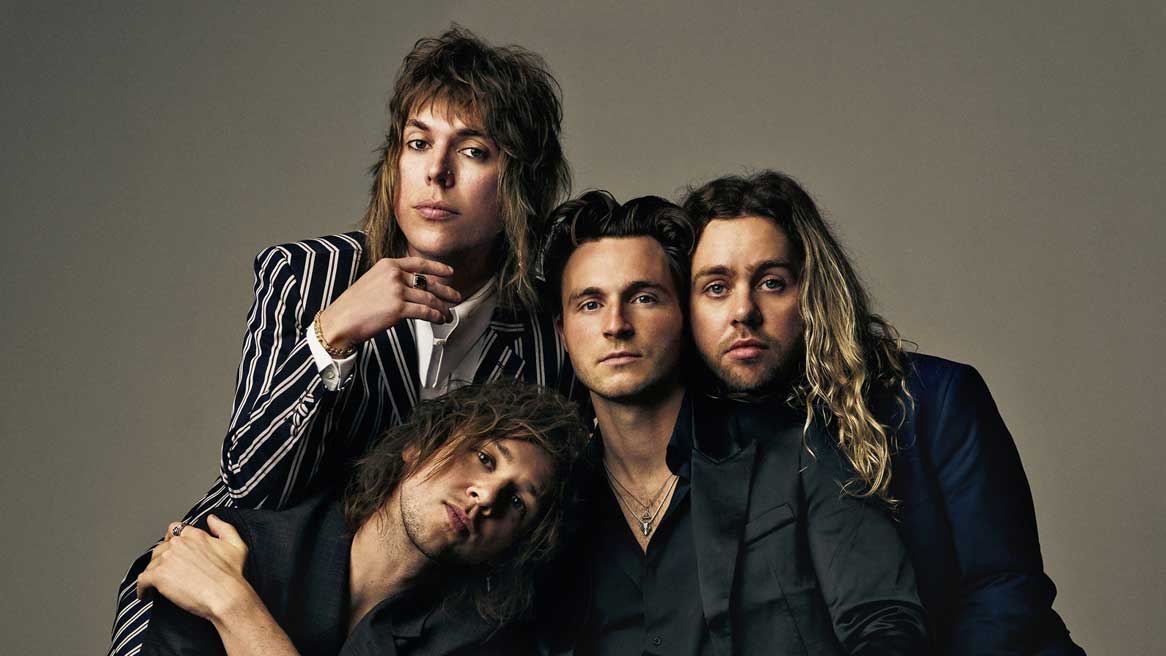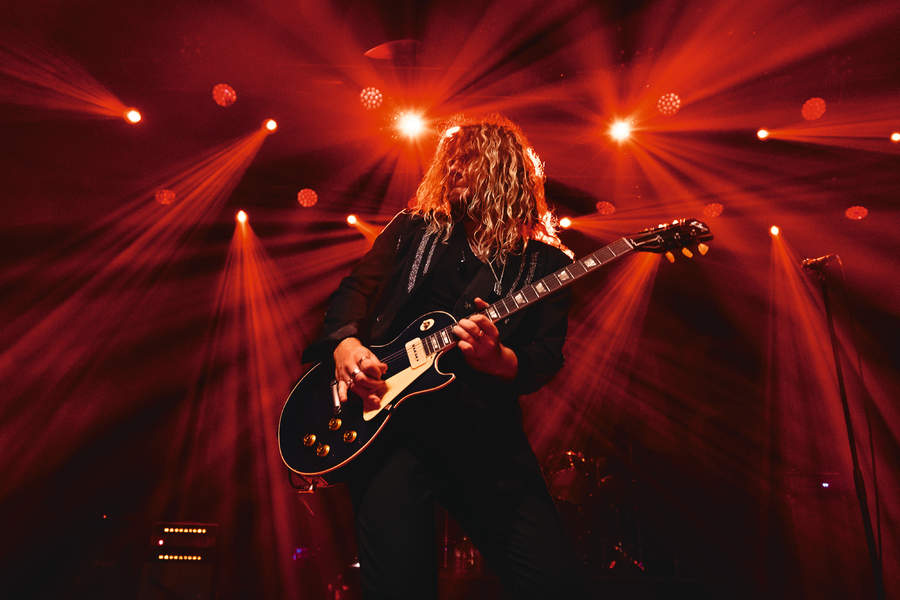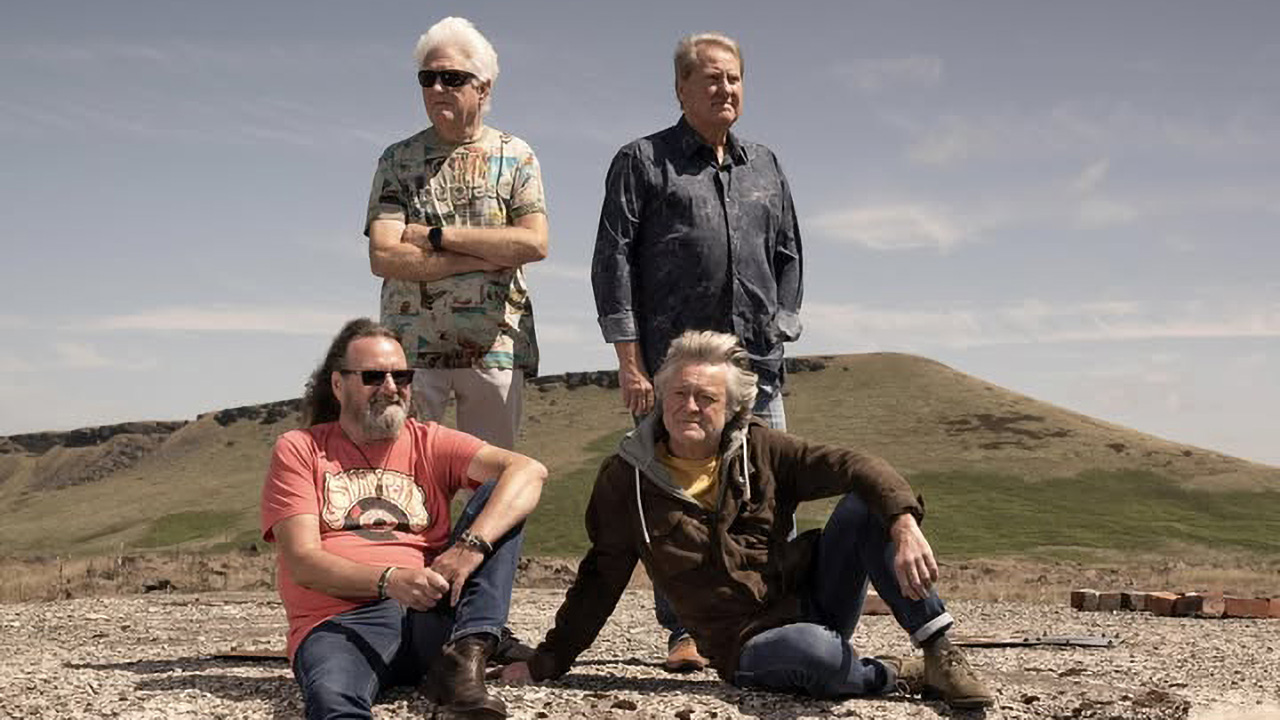"I want my Rolls-Royce Silver Cloud. I want to find real love. I want to make more money than I ever have": Wild nights on the road with The Struts
The Struts have made bad decisions, suffered imposter syndrome and much more, but they haven't stopped wanting to be the biggest and the best

One night in Miami, through a blur of tequila and bad decisions, Luke Spiller realised he had gone too far.
Arguably it was always going to happen. An aspiring dancer who studied Michael Jackson videos, taught himself piano and wore women’s clothes as a teenager, Spiller had long burned harder and faster than his peers. After relocating to Los Angeles, his maximalist personality was teamed with heavyweight glitz, bolstered pre-covid by a split with his long-term girlfriend, model Laura Cartier Millon. It was like striking a match over petrol.
As pandemic restrictions eased, things escalated in good ways and bad ones. There were days of fervoured creativity. People-watching and songwriting. Wild parties. Multiple girls. Nights in Hollywood that turned into days, waking up in “some stranger’s weird-ass apartment” and wondering what just happened.
It all peaked that pivotal Miami night, fuelled by tequila, pink cocaine and a rampant lack of inhibition. At one point, he tells us, everyone thought he was dead. The song Bad Decisions, a searing slice of honesty on The Struts’ career-topping fourth album Pretty Vicious, was born in his hotel room.
“I can’t go into too much detail,” he says. “I hurt a couple of people who didn’t deserve to be hurt. I was kind of seeing someone at the time, I really let them down, and it all came back and blew up in my face. But I managed to smooth everything over. It was sort of…” [he thinks about this] “I think there was a couple of moments last year where I just didn’t really give a fuck. I didn’t care what anyone was thinking.”
In one sense, that’s Spiller all over. It’s there in his stage presence – part Noddy Holder, part Liberace, part megachurch minister. It’s there in the songs that drew us to The Struts in the first place – proudly bold and bright while their contemporaries played it cool. The fearlessness that’s brought them this far.
It’s also there in the nuanced picture of success that Pretty Vicious paints: jubilant highs, vulnerable lows and a lot in between; reflections of four thirty-somethings who’ve seen and done so much since the precocious, “character-driven” days of Kiss This and Dirty Sexy Money.
Sign up below to get the latest from Classic Rock, plus exclusive special offers, direct to your inbox!
Recorded mostly live, and co-produced by Julian Raymond (Fleetwood Mac, Cheap Trick), Pretty Vicious is the band’s truest team effort to date, and their mercurial singer/chief lyricist’s most honest work. There’s joy and heartache here. More-ish grooves and guitars. Queen-esque harmonies. Snapshots of life in a time of money, sex and opportunity.
“This is on-the-money, real-life experiences,” bassist Jed Elliott says. “Hearing that vulnerability from Luke, I was super proud of him, because we’ve not always seen that come out through the music.”
“I was inspired by Ray Davies,” Spiller says. “It was a safe way of living out a fantasy. And then in the last couple of years life began to imitate art, for better or worse.”
He glances out of the tour bus window, looking a little younger in black joggings and a baggy jumper, his make-up-free eyes wide but calm.
“I kind of fell into it."

The car park at Nottingham’s Rock City is filling up. Crew members and gear move quickly as taxis deliver band members for the opening night of The Struts’ UK tour. It’s a family affair. Guitarist Adam Slack’s relatives and friends are all coming tonight. Spiller’s parents are riding on the tour bus for the next two nights. Elliott recently got married in Napa Valley (to Californian actress Virginia Gardner) and the band played at the wedding.
“Bless my mother-in-law, she said: ‘Do we tip the band?’” says a grinning Elliott, looking trendy but comfy in a Japanese-edition Struts jumper, like a Netflix star just off the plane. “I was like: ‘I’m in the band, I think we’re good! The boys, you put some instruments on stage, some wine, we’ll be dying to play anyway.’”
The past few years have been full of similarly ‘California’ times for the British foursome. There have been celebrity collaborations. Victoria’s Secret shows and after-parties. One New Year’s Eve with Tommy Lee, another at Nashville’s ‘Music City Midnight’ in 2019, the latter climaxing with Elliott and drummer Gethin Davies kissing on stage, sandwiched between Stevie Nicks and Nicole Kidman. Hallmarks of a strange life in Tinseltown.
“That was your last New Year’s kiss apart from your wife!” exclaims Davies, all long limbs and tattoos, mop of hair under a baseball cap. A trace of Welshness lingers in his voice, under the West Coast-honed surfer vibes and bright eyes.
“Oh, respect!” Elliott beams, realising. “We were both single at the time, not that we were looking for anything romantic with one another. But we looked around, we were pretty drunk, couldn’t find anyone else; we weren’t gonna snog Nicole Kidman or Stevie Nicks…”
It’s a far cry from their early days in nearby Derby, where they shared a house, wrote songs and abused their bodies, Withnail & I-style – in between playing gigs “about once a month”, mostly to Slack’s parents.
Tonight they’ll play to a much bigger audience, including an enthusiastic contingent from those early shows in the Derby and Nottingham areas, back when The Struts’ future – and the popularity of rock'n'roll in general – was far from certain.
Nottingham is full of memories for Adam Slack. Raised in Derby, the guitarist grew up going to punk shows at Rock City. The Struts played some of their first gigs at the now-defunct Spanky Van Dykes bar. When he visits home, he and his old friends go out here for chicken wings, beers and open-mic nights.
Periodically, the same group reunite as Adam Slack & The Bangers – Slack’s pre-Struts band – to play Green Day covers at The Hairy Dog pub in Derby. It’s a world away from the spin classes and sunshine of Calabasas, Los Angeles, where Slack lives with singer-songwriter girlfriend Kelsy Karter.
“I love it for one night, then I’m full,” he says of his frontman role with The Bangers. “I’m an okay singer. My vocal range is pretty shit. If I had Luke’s voice I’d probably enjoy it more.”
A shaggy-haired bundle of affable, nervous energy in black flares, ear piercings and an AC/DC T-shirt, Slack feels like the heart of The Struts, the quietly serious, Oasis-loving Richards to Spiller’s Jagger. Seven years ago he was diagnosed with OCD, which helped make sense of his struggles with anxiety. He’s no longer on medication, but does see a therapist.
“So when it does raise its head, I’m better equipped to deal with it. My imposter syndrome is just through the roof. I catastrophise everything. I get a call from management and I’m like: ‘Oh shit, the end of the world!’” he says, laughing. “But yeah, it’s just [a case of] dealing with it.”
As a kid Slack taught himself to play guitar through Green Day hits. Aged 13 he was writing songs and playing gigs. At a McFly signing at HMV in Nottingham, he slipped them a copy of his band’s CD.
“I remember getting there, I think four o’clock in the morning, with a bunch of girls, basically… We went, the four of us, and gave them a CD. Then Harry [Judd, McFly drummer] got in touch with me on MySpace and passed it on to their management.”
Through that, Slack was introduced to Spiller. They’ve now been a team for 14 years. Slack and Spiller are very different people, but they share an unwavering, totally sincere focus and ambition – a desire to be the biggest, the best.
“I want this album to be massive,” Slack says. “I think the dream is to be playing stadiums.”
“Our music’s made for bigger rooms than we’re playing,” Elliott says. “It always was. It’s my hope with this record that it connects in a bigger way.”
When it came to writing Pretty Vicious (named after its most ‘alternative’ track), there was debate as to which direction it would take. A lot of material was scrapped, much of it in the alt.pop vein that survives on the Wicked Game-esque title track, as well as the smoky, Stones-y groove of Better Love. Realising that most of the songs could be better – and that the world was finally warming to the old-school rock’n’roll they’d been advocating all along – it was decided that they needed to write a proper rock record, and do it right.
“We had so many people in our ears on the old label,” Slack says: “‘You can’t have the guitars too loud in the mix, it won’t be on radio’ and shit like that. Now there’s guitars everywhere. Pop stars are holding guitars. It’s cool to have guitars again.”
“A lot of times before, because we’d write quickly between touring, I’d kind of lay down the first thing that came out,” Elliott says. “I didn’t really feel I got to express myself on previous records. But I got to way more so on this one, where it did feel very celebratory, in this really cool vibey Nashville studio.”
On stage, the bassist provides much of the vocal harmonies that give The Struts their grin-inducing edge. He’s been harmonising most of his life, tarting with his parents’ Irish folk and pop records (his mother is Irish) followed by his high school band in Devizes, with whom he began touring when he was 14.
For Davies, who grew up above a pub in Llanddewi Brefi, listening to classic rock on the jukebox, the live nature of Pretty Vicious is a natural fit. You can hear it in the warm, cavernous beats of Hands On Me, the zingy crash ’n’ punch of Rockstar. “Going in every day, the camaraderie,” he says, “we’d go to the bar every night after and go: ‘Oh, that sounds the best.’ There was that kind of excitement. I think that shows on the tracks.”
It all feels like a reminder – after pop-heavy singles like Body Talks – of where their hearts really lie.
“We’ve always been a rock band, and always will be,” Slack says. “On the first two albums we pushed the production because we didn’t want to be… [he chooses his words carefully] I like Greta Van Fleet, but they are very… If they were in the seventies you’d believe it. Whereas we were always thinking: ‘How can we make the music we love, from that era, sound like a modern-day version of that, and push the envelope on it?’”
Their latest photos reveal a visually evolved group, too. Less kids who raided their aunt’s fancy-dress boxes, more 21st-century dandies. Fashion designer Ray Brown (dresser to Rival Sons and Judas Priest) did their latest threads. For Spiller, now sporting a dirty-blond thatch of Rod Stewart hair, it’s been a welcome change.
“I just got so fed up of being called Freddie Mercury all the time,” he sighs. “Not that that made me change it, but I was running with the black hair look for such a long while.
“Everyone’s wearing skirts now,” he continues. “Boys wearing skirts, the lines are super-blurred, which I think is great. But now everyone’s doing it it’s become the mainstream, even Måneskin getting to the heights they have. And I’m like, fuck that, I’m ready to be a bit more distinguished, a bit more elegant and, dare I say, even masculine. I don’t like to follow what everyone’s doing.”

Backstage at Rock City, Spiller considers the pearls around his neck. “I’m a bit worried they’ll break…” he mumbles, looking briefly timid for a man in black leather trousers and eye glitter. Twenty minutes later he’s on stage, waving his hands like the Messiah and bellowing: “Let me see you shake your arses!” to Dirty Sexy Money and Too Good At Raising Hell – the sort of ultra-glitz The Struts do so well. Catchy reflections of Spiller’s hedonistic escapades, which fuelled much of Pretty Vicious.
“There’d be a session,” Slack recalls, “he’d arrive first, to be fair, and go: ‘What did you do last night?’ I’d be like: ‘Stayed in and watched Love Island with Kelsy. So what did you do?’ And it was like [he laughs, raising thick eyebrows] okay.”
Since the cocaine-fuelled night in Miami, Spiller has led a calmer life. He lives in Burbank, just across from the celebrity homes and sushi restaurants of Studio City. He writes songs with ex-Jellyfish guitarist Jason Faulkner at his house in Silverlake, and plays bowls in Beverly Hills with retired NASA engineers and film producers. The sort of old-Hollywood glamour he loves.
“There’s one bloke who drives the most beautiful Rolls-Royce, I think he’s got about four or five of them, and a private jet… Yeah, they’re quite an interesting bunch.”
During the pandemic, Spiller found himself similarly engaged at the bowls club in Dawlish, Devon. Hunkered down in a house that his parents had been renting out, he wrote songs, smoked weed and drank coffee at the piano, and went to the local pub for Happy Hour. A solo album began to evolve (in addition to the musical he’s had in the works), built around “piano, vocal and orchestral accompaniment”, all about love, sex and heartbreak. It was, Spiller says, the greatest summer of his life.
“In LA everybody’s someone, or trying to be someone. And when you go somewhere like Dawlish, people are just being people in the nicest way possible. You have real conversations about real fucking things, rather than your Uber driver trying to give you a script when you’re on the way to the studio.”
Now back in America, he rarely goes to gigs. You’re more likely to find him at a jazz or blues night. He says there’s a connection between these nights and the religious environment he was raised in. Until the age of 16 he attended church every Sunday, watching his preacher/musician father in action.
“There’s no ego in it,” he reasons. “They’re not singing to impress. They’re tapping into something that no one can see, touch, but yet feel… There’s something really beautiful in that. Something so selfless, when people really mean it, and my dad means it. I guess in some ways that’s rubbed off onto me. The only way I knew how to perform was coming from a place of passion.”
On stage at Rock City, that fervour emanates from old favourites like Primadonna Like Me, married with the extravagant spirit of a man who was never going to follow his father into the church. Passion and perspiration double as the night progresses. The audience sings every word of Put Your Money On Me as if it were Hey Jude or Wonderwall.
Afterwards we find Spiller backstage with a towel around his shoulders, his songwriter girlfriend, Kate, and his father at his sides. Davies gives us a sweaty hug and chats to Slack’s partner Kelsy, all leathers and long black hair. The gig went brilliantly, and they know it.
“It was just joy joy joy!” Spiller Snr exclaims, his preaching days coming out through hand gestures. “That separates them from other rock bands, this intense joy.”

Two nights later it’s a similar story at London’s Forum, all heartfelt singalongs, big hitters and Spiller’s jazz hands, bounding across the stage in a long Union Jack-coloured jacket. At the aftershow the frontman works the room in winklepickers and a yellow checked suit, like a Bay City Roller at a cocktail party.
“I wrote down a list of things I want to achieve in the near future,” he mused earlier. “I want my Rolls-Royce Silver Cloud, I want to find real love, I want to make more money than I ever have, and I want to create five top-ten singles. And I want to carry on pursuing my solo stuff, and finish the fucking musical. So those are my goals.”
The mood is similarly buoyant. Elliott shows us a vaguely Buddhist tattoo done by a “coked-up Frenchman” one tour. Drinks flow, and the four of them chat to industry people, family, friends and fans, without the distance or weirdness that usually comes with a certain level of success. They feel like people you’d gladly go to the pub with. Spiller’s dad looks on, remembering his own jazz-handed ‘show me your hands’ moves as a minister – moves that his boy has clearly absorbed.
“He’s a lovely son, I miss him a lot, but he belongs to the world,” he says. It’s strange, now, to think of the churchgoing teen who studied Michael Jackon videos and shut himself away for hours, learning the piano and dreaming. As to the secret of his impact, his father’s explanation is unhesitating: “People want to be led,” he says simply.
Pretty Vicious is out now via Big Machine/ John Varvatos.

Polly is deputy editor at Classic Rock magazine, where she writes and commissions regular pieces and longer reads (including new band coverage), and has interviewed rock's biggest and newest names. She also contributes to Louder, Prog and Metal Hammer and talks about songs on the 20 Minute Club podcast. Elsewhere she's had work published in The Musician, delicious. magazine and others, and written biographies for various album campaigns. In a previous life as a women's magazine junior she interviewed Tracey Emin and Lily James – and wangled Rival Sons into the arts pages. In her spare time she writes fiction and cooks.
